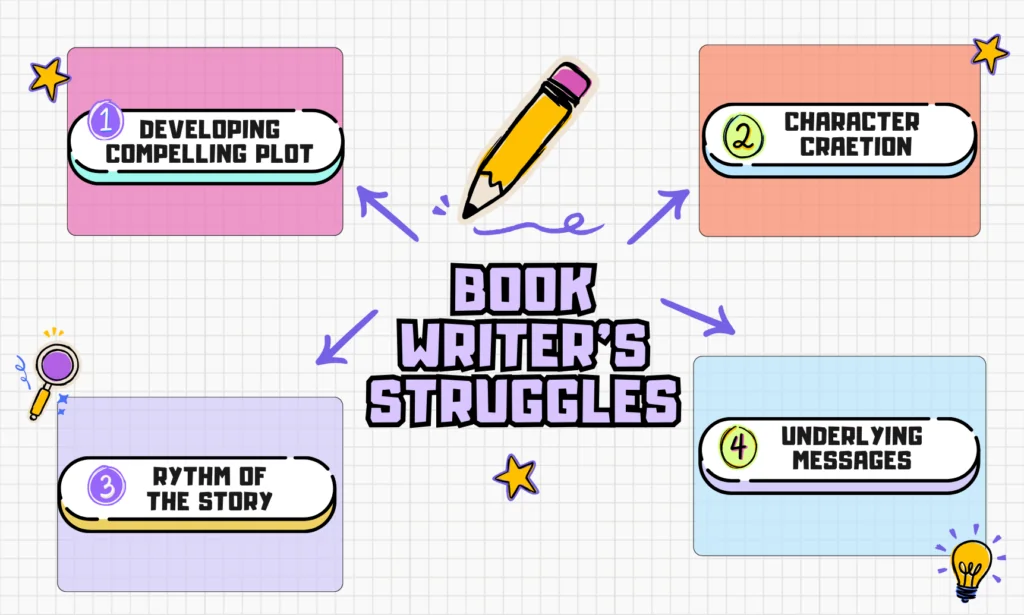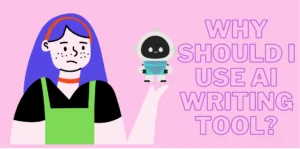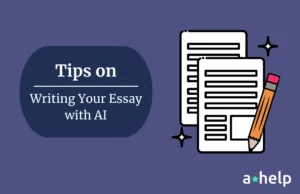Setting on the journey of writing a book is an adventure that promises fulfillment yet is filled with challenges that can haunt even the most enthusiastic of creators. Today, as technology continues to reshape our world, Artificial Intelligence (AI) brings hope to aspiring authors. With this piece, we want to explore how to use AI to write a paper and how to optimize book writing.

✅ AI Essay Writer ✅ AI Detector ✅ Plagchecker ✅ Paraphraser
✅ Summarizer ✅ Citation Generator
A Guide to AI Book Writing

AI book writing is not so much of a straightforward process. It involves a series of steps, each requiring thoughtful consideration. Here’s a closer look at each stage in the process, designed to guide you through this creative adventure with a bit more detail:
1. Setting the Foundation
The first step is basically like laying the cornerstone of a building. You need to define the heart and soul of your book. This includes deciding on the genre, whether it’s a heart-pounding thriller, a soul-stirring romance, or a mind-bending science fiction saga. Next, sketch out the initial plot and think about the characters that will inhabit your world. AI tools can be incredibly useful in brainstorming sessions, offering a selection of ideas at the click of a button. Yet, it’s necessary to remember that the most resonant stories come from a place of personal passion and vision. Use AI as a springboard to kindle your creativity, but let your own experiences and aspirations guide the direction of your tale.
2. Structuring Your Narrative
With the foundation in place, it’s time to construct the skeleton of your story. This is where AI can be a true ally, helping to outline your narrative and establish a coherent structure. Think of AI as a co-plotter, suggesting possible plot progressions, chapter breaks, and even narrative twists that can add depth to your story. However, the key is melding AI efficiency with human intuition. Pay attention to how each suggested element fits into the broader narrative of the story, making every twist and turn feel authentic and inseparable from the overall journey of your characters.
3. Character Development
Characters are the lifeblood of any story, and developing well-rounded, compelling characters is essential. AI tools can offer fascinating insights into character backstories, motivations, and even psychological profiles, catalyzing creativity. Dive into these AI-generated suggestions to flesh out your characters, but remember, the most memorable characters are those with whom readers can forge an emotional connection. Infuse your characters with your understanding of human nature, drawing from personal experiences, observations, and empathy to bring them fully to life.
4. Drafting with AI
Now comes the exhilarating part: drafting your book. AI can significantly expedite this process, generating text based on the parameters you’ve set. This can be particularly useful for overcoming writer’s block or filling in parts of the narrative that don’t require as much nuance. However, it’s essential to approach this step with a discerning eye. Regularly review and revise the AI-generated content to make it align with your narrative voice and the emotional tone of your story. This is your tale to tell, and every word should echo with your unique timbre.
5. Editing and Refinement
The final polish of your manuscript involves rigorous editing and refinement, areas where AI can offer substantial assistance. Not every free essay writing service does it, but most AI-powered tools can catch grammatical errors, suggest stylistic improvements, and even help the coherence across the narrative. But the soul of your story—its voice, pacing, and emotional resonance—rests in your hands. Use AI suggestions as a guide, but trust your instincts when it comes to the final judgment. Your narrative style and the integrity of your vision are what will truly captivate your readers.
Navigating the process of AI-assisted book writing is an exercise in balance, blending the innovative power of technology with the irreplaceable depth of human creativity. Engagi with each step thoughtfully, paying close attention to how AI can serve your storytelling goals, and always prioritize your unique voice and vision, so you can harness the full potential of AI and bring your literary dreams to life.
The Struggles of Book Writing
Writing a book is no small feat. It demands not just a spark of creativity but a continuous blaze that can sustain the long and often arduous process of bringing a narrative to life. The process of writing a book is complex and multifaceted, involving far more than simply penning down thoughts. Authors find themselves in the role of architects and weavers, meticulously constructing the framework of their narrative universe.
The development of a compelling plot is just the beginning. Writers must also make sure each twist and turn is both surprising and satisfying. Character creation is another cornerstone of the writing process, demanding a deep understanding of human nature. Authors have to instill flaws into their characters, as well as desires, and growth. After all, these characteristics are what make them relatable and memorable to readers. But crafting a narrative and populating it with characters is only part of the challenge.

Pacing is vital; it’s the rhythm that guides the reader through the story, determining when to quicken the pace with action or slow down for reflection. Themes, the underlying messages or questions woven throughout the narrative, require careful integration to provoke thought without overshadowing the story. All these elements must be balanced with a unique voice and a distinct tone that carries the reader and resonates emotionally, making the story truly impactful.
This balancing act between creativity and structure, between innovation and consistency, is what makes book writing an arduous task. It demands passion for storytelling as well as a disciplined approach to the craft. The dreaded specter of writer’s block looms large, able to make the most inspired writers stall. This common struggle, where words refuse to flow, and ideas seem just out of reach, can leave authors battling frustration and doubt. Overcoming these struggles is part of the journey, requiring resilience and perseverance to move forward and transform a vision into a published reality.
Is it Possible to Use AI to Write a Book?
Is it indeed possible to use AI to write a book? The short answer is a resounding yes, and the journey into AI-assisted writing is nothing short of a foray into a new frontier of creativity. With the advent of sophisticated AI writing tools powered by groundbreaking algorithms and machine learning, authors now have at their disposal a veritable Swiss Army knife for the literary process. These AI assistants can churn out drafts, brainstorm plot ideas, and even fabricate characters with backstories more intricate than one might initially believe possible.
How is this Process Organized
The process begins with feeding your AI tool of choice the seed of your story – perhaps a theme, a setting, or a character sketch. From this seed, AI can sprout an array of narrative paths, suggesting developments and directions that might not have occurred to you. It’s akin to planting a garden with a variety of potential blooms; you decide which flowers to water, which to prune, and which to let grow wild. For character development, AI tools can be particularly inventive, offering psychological depth and histories that provide a solid foundation for growth and interaction within your narrative.
Plot twists, those deliciously unexpected turns that keep readers on the edge of their seats, can also be AI’s forte. With access to vast databases of narrative structures and tropes, AI can propose twists that are both surprising and fitting, ensuring your story remains engaging and unpredictable.
Possible Drawbacks
However, like any tool, AI writing assistants come with their own caveats. The risk of over-reliance on AI can lead to narratives feeling somewhat generic or lacking the nuanced touch of human emotion and experience. The warmth of human storytelling, with all its imperfections and idiosyncrasies, cannot be fully replicated by algorithms. This is where the true artistry of the author comes into play. By treating AI as a source of inspiration and support rather than a ghostwriter, authors can weave their personal insights, emotions, and experiences into AI-generated content. This hybrid approach allows AI’s efficiency and innovation to blend seamlessly with the authenticity and emotional depth of human creativity.
Integrating AI into the book-writing process is thus not about relinquishing control but about expanding one’s creative toolkit. It’s about harnessing the power of technology to explore uncharted narrative territories and experiment with novel story arcs and character dynamics, all while keeping your unique voice and vision at the forefront of the creative endeavor. As we venture further into this collaboration between humans and artificial intelligence, the possibilities for storytelling are as limitless as our imagination. So, let’s embrace AI not as a replacement for the human touch in writing but as a catalyst for creativity, a means to push the boundaries of what we can conceive and achieve as storytellers.
Choosing a Tool to Write Your Book
Selecting the right AI tool is half the battle in this book-writing journey. Yet, it’s a very important half. That’s why we created this guide to help you paint a vivid image of what are the signs of a high-quality AI writing tool for books.
- Flexibility in Creativity – Your AI tool should be a fountain of creativity, not a bottleneck. Seek out software that encourages you to push boundaries and explore new narrative territories. This means looking for a system that can adapt to your whims, whether you’re sketching out a dystopian future one day or delving into a historical romance the next.
- Ease of Use – A tool is only as good as your ability to use it effectively. No matter how powerful an AI writing assistant might be, if navigating its interface feels like decoding ancient hieroglyphs, it’s not going to be much help. Look for software with an intuitive interface, one that makes it easy to jump right into writing, editing, and organizing your work.
- Customization Capabilities – Your writing process is as unique as your fingerprint, and your AI tool should be able to accommodate that. Whether it’s adjusting the tone and style of generated content or tailoring character and plot suggestions to suit your narrative, customization is key.
- Genre Specialization – If you’re diving deep into a specific genre, whether it’s science fiction, fantasy, mystery, or any other, consider looking for AI tools that have strengths in that area. Some AI writing assistants are designed with particular genres in mind, equipped with databases and algorithms that are finely tuned to generate ideas, plots, and characters that fit genre conventions while still offering room for innovation.
- Extensive Editing Capabilities – Beyond generating content, your AI tool should also be an adept editor. Look for features that go beyond basic grammar and spell checks, offering style and readability suggestions, consistency checks for character names and plot points, and even feedback on pacing and dialogue.
- Ethical AI Framework – It’s essential to consider the ethical implications of the tools we use. Choose AI software that is transparent about its data sources, respects copyright laws, and is committed to responsible AI practices. This not only supports your creative process with ethical technology but also aligns your writing practice with broader values of fairness and integrity.
- Market Research and Reviews – Finally, don’t underestimate the power of due diligence. Dive into market research, read reviews, and, if possible, test out software before committing. Many AI writing tools offer trial periods or demo versions, allowing you to get a feel for their capabilities and how they mesh with your writing style. Pay attention to feedback from other writers, especially those working in your genre or with similar creative goals, as their experiences can provide valuable insights into how well a tool might meet your needs.
When picking out a tool to work with, find a balance between technical prowess and creative synergy. By prioritizing flexibility, ease of use, customization, genre specialization, editing capabilities, ethical practices, and conducting thorough research, you’ll be well-equipped to choose software that not only fits your technical requirements but also truly supports and enhances your creative vision.
Conclusion
The fusion of AI with the human imagination opens up unprecedented avenues for storytelling. We are at the start of an exciting journey where the future of writing books lies in how writers can use this technology to open their creativity chakras. By working with AI as a companion in the creative process, authors can overcome traditional hurdles, enriching their narratives and bringing their stories to life in ways previously unimaginable.
The key fact is:
AI isn’t a replacement for human creativity – it is a catalyst that amplifies it, guiding us toward new horizons in storytelling.
FAQ
Follow us on Reddit for more insights and updates.





Comments (0)
Welcome to A*Help comments!
We’re all about debate and discussion at A*Help.
We value the diverse opinions of users, so you may find points of view that you don’t agree with. And that’s cool. However, there are certain things we’re not OK with: attempts to manipulate our data in any way, for example, or the posting of discriminative, offensive, hateful, or disparaging material.